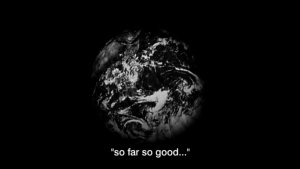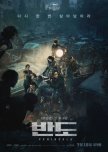Peninsula was filmed on a budget almost twice as high as Train to Busan, and, unlike many sequels, retained the same director. It is therefore beyond me how Peninsula was not only lacklustre compared to TTB but utterly devoured by the predecessor. Actually, it isn't beyond me; while Peninsula is a sequel to TTB set a few years in the future, the elements of TTB that made it engrossing were sucked out and replaced with generic fluff, in much the same way that fast food chains might hollow out a perfectly good pizza crust and squeeze in some cheap, tasteless derivation of mozzarella. Here is a list of what made TTB fantastic and what Peninsula had in its place;
TTB:
Varied cast of characters defined (and unwrought) by their human imperfections, buoyed by a range of fantastic, occasionally despicable performances. You and I, and how we'd react to a sudden zombie apocalypse. Also, great character development for the main 'hero'.
Sense of high production value due to a cleverly used physical setting (train interior) and fantastic attention to detail with the zombies themselves. Behind the clips footage shows the efforts that the team undertook to paint up each individual zombie to seem rabid, horrible and ironically life-like.
Aside from their appearance, the zombies were excellent not only because of the frightening manner in which they twitched, scuttled and savaged their human brethren but because we saw that they too were normal, unsuspecting humans. There was great pathos in seeing members of the cast turn into these beasts, even moreso when the living had to fight against their own friends.
Novel concept (the train) that created a constant feeling of entrapment and claustrophobia, the notion that although one is on the move the threat is always breathing down their necks or clawing on the next set of doors.
Simple yet well-executed social allegory about class division, the pitfalls of Capitalist greed and the dangers of individual self-preservation towards the collective fight for survival.
Peninsula:
A varied cast of characters let down by being either too bland (the hero) or absurd to fully empathise with. The 'villains' in TTB are the sneering upper-class bigots that you might see in real life. The 'villains' in Peninsula, while not out of place in a post-apocalyptic film, were too cartoonish to see as realistic or despicable. And while Train To Busan kept me guessing until the end, Peninsula made it easy to see who death was hovering over.
A larger budget that was squandered on an over-reliance on CGI. While certain scenes of the destroyed Korea carried weight, the backgrounds and especially the car chases often felt nauseatingly cheap-looking.
'Weight' is a theme that can be considered more broadly when comparing the two films- both emotional and physical. In TTB, the human struggle was emphasised by the improvised weapons- baseball bats, sports gear and the fists of the survivors. These 'weapons' carried weight with them.The close-quarters combat was brutal and ugly, we were seeing ordinary people having to struggle and fight for their lives. By contrast in Peninsula, guns were used abundantly, mowing down hordes of zombies in great swathes- diminishing both the threat of the zombies and the desperation of the humans (though this was still present).
The zombies themselves lacked weight. From friends and family turned into cannibalistic beasts, they became rag-dolls that would be sent flying with a well-timed car impact, video game entities that could be thwarted and exploited en masse with a few (admittedly clever) tricks. It didn't help that they too were CGI much of the time.
Awful, and awfully abundant English dialogue that was sometimes as coherent as the zombie screeching.
Derives too heavily from pre-existing media like the Mad Max franchise.
Melodramatic like TTB yet lacking the first movie's well-deserved emotional punch. A lot of sentimental music and slow-motion crying scenes. All the meaning in Peninsula essentially boils down to basic moral waffle like 'Make sacrifice good', 'Family important' and 'Repent for mistakes good'.
...
Was Peninsula a terrible movie? No, in fact it was mildly entertaining overall and while I wanted to do something else, I managed to sit through it without skipping parts. It's a decent enough watch but lacks substance.
TTB:
Varied cast of characters defined (and unwrought) by their human imperfections, buoyed by a range of fantastic, occasionally despicable performances. You and I, and how we'd react to a sudden zombie apocalypse. Also, great character development for the main 'hero'.
Sense of high production value due to a cleverly used physical setting (train interior) and fantastic attention to detail with the zombies themselves. Behind the clips footage shows the efforts that the team undertook to paint up each individual zombie to seem rabid, horrible and ironically life-like.
Aside from their appearance, the zombies were excellent not only because of the frightening manner in which they twitched, scuttled and savaged their human brethren but because we saw that they too were normal, unsuspecting humans. There was great pathos in seeing members of the cast turn into these beasts, even moreso when the living had to fight against their own friends.
Novel concept (the train) that created a constant feeling of entrapment and claustrophobia, the notion that although one is on the move the threat is always breathing down their necks or clawing on the next set of doors.
Simple yet well-executed social allegory about class division, the pitfalls of Capitalist greed and the dangers of individual self-preservation towards the collective fight for survival.
Peninsula:
A varied cast of characters let down by being either too bland (the hero) or absurd to fully empathise with. The 'villains' in TTB are the sneering upper-class bigots that you might see in real life. The 'villains' in Peninsula, while not out of place in a post-apocalyptic film, were too cartoonish to see as realistic or despicable. And while Train To Busan kept me guessing until the end, Peninsula made it easy to see who death was hovering over.
A larger budget that was squandered on an over-reliance on CGI. While certain scenes of the destroyed Korea carried weight, the backgrounds and especially the car chases often felt nauseatingly cheap-looking.
'Weight' is a theme that can be considered more broadly when comparing the two films- both emotional and physical. In TTB, the human struggle was emphasised by the improvised weapons- baseball bats, sports gear and the fists of the survivors. These 'weapons' carried weight with them.The close-quarters combat was brutal and ugly, we were seeing ordinary people having to struggle and fight for their lives. By contrast in Peninsula, guns were used abundantly, mowing down hordes of zombies in great swathes- diminishing both the threat of the zombies and the desperation of the humans (though this was still present).
The zombies themselves lacked weight. From friends and family turned into cannibalistic beasts, they became rag-dolls that would be sent flying with a well-timed car impact, video game entities that could be thwarted and exploited en masse with a few (admittedly clever) tricks. It didn't help that they too were CGI much of the time.
Awful, and awfully abundant English dialogue that was sometimes as coherent as the zombie screeching.
Derives too heavily from pre-existing media like the Mad Max franchise.
Melodramatic like TTB yet lacking the first movie's well-deserved emotional punch. A lot of sentimental music and slow-motion crying scenes. All the meaning in Peninsula essentially boils down to basic moral waffle like 'Make sacrifice good', 'Family important' and 'Repent for mistakes good'.
...
Was Peninsula a terrible movie? No, in fact it was mildly entertaining overall and while I wanted to do something else, I managed to sit through it without skipping parts. It's a decent enough watch but lacks substance.
Was this review helpful to you?
























